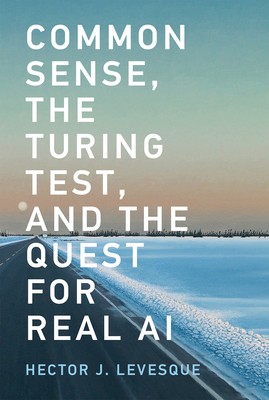
- We will send in 10–14 business days.
- Author: Hector J Levesque
- Publisher: MIT Press
- ISBN-10: 0262535203
- ISBN-13: 9780262535205
- Format: 13 x 19.6 x 1.3 cm, softcover
- Language: English
- SAVE -10% with code: EXTRA
Common Sense, the Turing Test, and the Quest for Real AI (e-book) (used book) | bookbook.eu
Reviews
Description
What artificial intelligence can tell us about the mind and intelligent behavior.What can artificial intelligence teach us about the mind? If AI's underlying concept is that thinking is a computational process, then how can computation illuminate thinking? It's a timely question. AI is all the rage, and the buzziest AI buzz surrounds adaptive machine learning computer systems that learn intelligent behavior from massive amounts of data. This is what powers a driverless car, for example. In this book, Hector Levesque shifts the conversation to "good old fashioned artificial intelligence," which is based not on heaps of data but on understanding commonsense intelligence. This kind of artificial intelligence is equipped to handle situations that depart from previous patterns--as we do in real life, when, for example, we encounter a washed-out bridge or when the barista informs us there's no more soy milk.
Levesque considers the role of language in learning. He argues that a computer program that passes the famous Turing Test could be a mindless zombie, and he proposes another way to test for intelligence--the Winograd Schema Test, developed by Levesque and his colleagues. "If our goal is to understand intelligent behavior, we had better understand the difference between making it and faking it," he observes. He identifies a possible mechanism behind common sense and the capacity to call on background knowledge: the ability to represent objects of thought symbolically. As AI migrates more and more into everyday life, we should worry if systems without common sense are making decisions where common sense is needed.
EXTRA 10 % discount with code: EXTRA
The promotion ends in 16d.21:14:37
The discount code is valid when purchasing from 10 €. Discounts do not stack.
- Author: Hector J Levesque
- Publisher: MIT Press
- ISBN-10: 0262535203
- ISBN-13: 9780262535205
- Format: 13 x 19.6 x 1.3 cm, softcover
- Language: English English
What can artificial intelligence teach us about the mind? If AI's underlying concept is that thinking is a computational process, then how can computation illuminate thinking? It's a timely question. AI is all the rage, and the buzziest AI buzz surrounds adaptive machine learning computer systems that learn intelligent behavior from massive amounts of data. This is what powers a driverless car, for example. In this book, Hector Levesque shifts the conversation to "good old fashioned artificial intelligence," which is based not on heaps of data but on understanding commonsense intelligence. This kind of artificial intelligence is equipped to handle situations that depart from previous patterns--as we do in real life, when, for example, we encounter a washed-out bridge or when the barista informs us there's no more soy milk.
Levesque considers the role of language in learning. He argues that a computer program that passes the famous Turing Test could be a mindless zombie, and he proposes another way to test for intelligence--the Winograd Schema Test, developed by Levesque and his colleagues. "If our goal is to understand intelligent behavior, we had better understand the difference between making it and faking it," he observes. He identifies a possible mechanism behind common sense and the capacity to call on background knowledge: the ability to represent objects of thought symbolically. As AI migrates more and more into everyday life, we should worry if systems without common sense are making decisions where common sense is needed.


Reviews